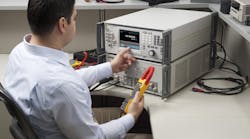by John Rhea
WASHINGTON - The changes that are sweeping the military and aerospace electronics industry are a subset of forces, still relatively ill defined, that are remaking what we call the Information Revolution.
What is visible in this particular industry is the inevitable consolidation among the big prime contractors in the aftermath of the Cold War, a consolidation that has by no means run its course.
Driven by the demands of commercial markets, meanwhile, the producers of electronic components continue to drive up performance and drive down costs of what have become commodity products. In the middle are a host of entrepreneurs that add value to those commodity products and in the process determine the utility of the end systems.
What is beyond the horizon is how these changes may completely alter the nature of the industry. It is almost axiomatic that in their initial stages new technologies simply mechanize existing processes. This step is usually welcomed because it improves efficiencies and expands markets. There are also frequently unwelcome side effects, however, when inefficient processes are inadvertently mechanized.
In trying to chart the future path of the industry there is a tendency to focus on the means rather than the goals. This is understandable. The pioneers of the Industrial Revolution 200 years ago had only the vaguest ideas of where their technologies were leading them. It took more than 50 years from when James Watt built his improved steam engine in 1776 until somebody arrived at the logical decision in 1829 of using the engines to carry passengers and cargo over railroads.
"What we call the Information Revolution is actually a Knowledge Revolution," maintains premier management consultant Peter Drucker. "What has made it possible to routinize processes is not machinery; the computer is only the trigger." Writing in last October's issue of The Atlantic Monthly, Drucker concludes, "The key is not electronics; it is cognitive science."
Drucker's article is replete with examples of technologies that caused sweeping changes far beyond the imagination of their creators. In 1455, long before the Industrial Revolution, Johanne Gutenberg perfected the printing press and movable type. All this new technology did was expedite the laborious hand copying of religious literature by monks. The first secular book, Machiavelli's The Prince, was not published until 1513 and quickly became the "other best seller" after the Bible.
Despite our pretensions of greater sophistication, we're not doing any better today than Watt and Gutenberg. The modern computer - after a false start by Charles Babbage in England in the 1830s and the refinement of today's stored-program digital electronic machine in the 1940s - didn't come into widespread use until after the development of microprocessors and semiconductor memories in the 1970s. We are still learning how to use this machine.
An unintended consequence of the pervasive nature of computing is electronic commerce, or e-commerce, which is already causing profound social and economic change. Here is an example of a confluence of technologies that nobody could - or at least did - predict. Drucker cites "the explosive emergence of the Internet as a major, perhaps eventually the major, worldwide distribution channel."
Jack Shaw, chairman of Hughes Network Systems in El Segundo, Calif., looks for global e-commerce to reach a value of at least $2 trillion by the year 2003, and he proposes to cash in on this new opportunity with improved space assets and the company's own very small aperture terminals, or VSATs, which are used for network communications. Speaking at a conference last summer of Mail Boxes Etc. in Dallas, Shaw cited the successes to date of such innovative companies as Wal-Mart and Mobil Oil, which are linking their stores with VSATs to improve customer service.
Here is a case of one new technology muscling out another, and any company venturing into the uncharted waters of new technologies should watch this example. Fiber optic cables cost $200,000 per mile to install, Shaw notes, and entire networks can run into the billions. This is far too expensive for any but the largest organizations and thus limits the market.
"This is what we call the 'last-mile' problem - how to provide affordable connections to consumers and most business sites," Shaw explains. Yet, the demand is verifiable and the necessary supporting technologies will inevitably follow. VSATs are one means. There will likely be others.
Implicit in what Drucker and Shaw are saying is the need to work from an existing technology base but not to tie ourselves to it such that it blinds us to new opportunities. The hardware is readily available, much of it off-the-shelf. The trick is to optimize it with expert systems based on what in many cases are centuries-old human experiences in dealing with day-to-day needs for food, shelter, transportation, and the like.
Moreover, this is a good time for companies in today's military and aerospace markets to explore ways to leverage their capabilities to capture a share of such emerging industries as e-commerce.
The current economic boom shows no signs of abatement. In fact, Federal Reserve Chairman Alan Greenspan notes that a significant factor in this boom has been the recent surge in productivity to an annual average of 3 percent. If sustained, this can be the magic bullet that supports sustainable economic growth coupled with low inflation and unemployment rates. The net result is that companies should have the means to prepare for the future.
From his lofty perch Drucker effectively sums up the situation facing all high-technology firms today this way: "The one thing (to say it again) that is highly probable, if not nearly certain, is that the next 20 years will see the emergence of a number of new industries. At the same time, it is nearly certain that few of them will come out of information technology, the computer, data processing, or the Internet."


